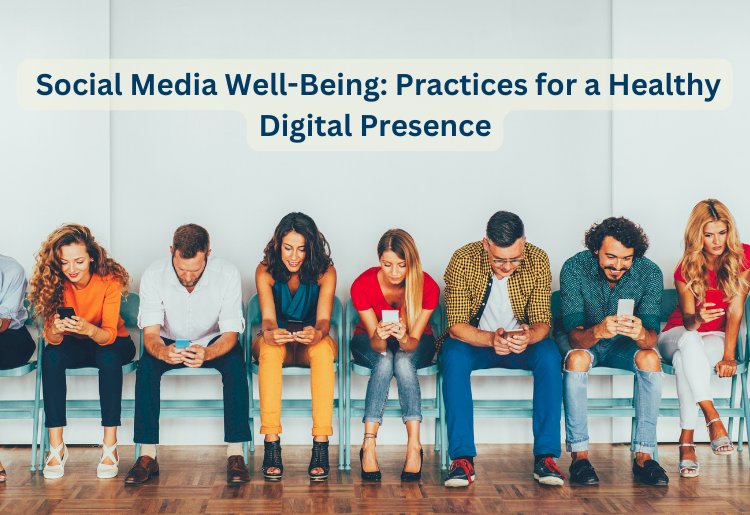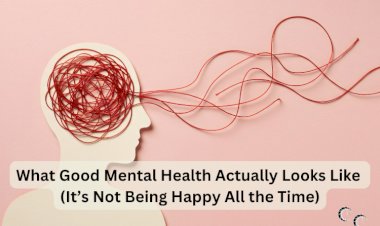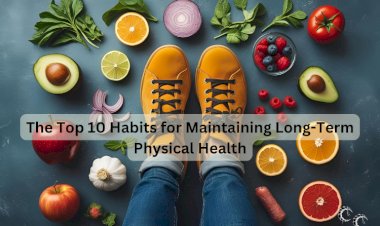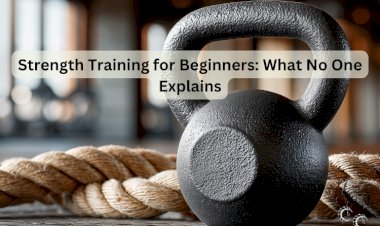Social Media Well-Being: Practices for a Healthy Digital Presence

In today's digitally connected world, social media is a significant part of our daily lives. It offers a platform for connection, self-expression, learning, and entertainment, but it can also contribute to stress, anxiety, and even burnout if not managed carefully. Maintaining a healthy relationship with social media is essential for mental and emotional well-being. Here are some practices for cultivating a balanced and mindful digital presence.
1. Set Boundaries for Screen Time
Excessive screen time, particularly on social media, can lead to information overload and fatigue. Setting clear boundaries around how much time you spend online can help you maintain a sense of control. Consider setting daily time limits using apps or phone settings that track your usage.
Tips:
- Schedule "social media-free" hours each day to engage in offline activities.
- Set a specific time for social media use, such as during lunch breaks or after work.
- Take digital detox days to reset and recharge.
2. Curate Your Feed for Positivity
The content you consume on social media can significantly impact your mood and outlook. Curating your feed by following accounts that inspire, motivate, or bring joy can help reduce negative emotions. Pay attention to how certain accounts make you feel and unfollow those that trigger stress or anxiety.
Tips:
- Follow content that aligns with your values, goals, and interests.
- Avoid accounts that promote unhealthy comparisons or unrealistic expectations.
- Seek out pages or groups that promote mental health, wellness, and positivity.
3. Practice Mindful Engagement
Instead of mindlessly scrolling through your feed, practice mindful engagement. Be intentional about the content you interact with and the messages you post. Mindful social media use encourages positive interactions, fosters meaningful connections, and helps reduce the temptation to compare yourself to others.
Tips:
- Reflect on your mood before engaging with social media to ensure you’re in a positive headspace.
- Take breaks during scrolling sessions to reflect on how the content is affecting you.
- Engage with friends and followers by leaving thoughtful comments or sharing supportive messages.
4. Limit Your Exposure to Negative News
While staying informed is important, constant exposure to negative news, especially on social media, can increase feelings of anxiety, stress, and helplessness. Strive to balance staying updated with taking care of your mental health by controlling how and when you consume news.
Tips:
- Choose specific times of day to check the news rather than constantly refreshing your feed.
- Follow reliable news sources, but balance them with accounts that promote uplifting content.
- Consider muting certain hashtags or words that bring unnecessary stress.
5. Take Time to Disconnect
It's easy to feel overwhelmed by the constant connection that social media offers. Disconnecting from time to time can help you recharge and refocus on offline relationships and activities. Regular digital detoxes can boost your mental health and give you the opportunity to rediscover hobbies and personal interests.
Tips:
- Use “Do Not Disturb” mode during certain hours to avoid distractions.
- Establish tech-free zones in your home, such as the bedroom or dining area.
- Replace social media with other activities like reading, journaling, or spending time outdoors.
6. Engage in Meaningful Conversations
Social media can sometimes feel like a one-sided experience, where users passively consume content. Instead, use social platforms as tools for engaging in meaningful conversations with others. This deepens connections and helps build a supportive online community.
Tips:
- Engage in discussions that foster learning, support, or shared experiences.
- Avoid getting into unnecessary arguments or confrontations online.
- Use social media to check in on friends and family, especially during challenging times.
7. Be Conscious of Comparison Traps
It’s easy to fall into the trap of comparing your life to others on social media, especially when many posts are carefully curated to show only the highlights. Constant comparisons can lead to feelings of inadequacy, self-doubt, or even depression.
Tips:
- Remind yourself that social media often portrays a highlight reel, not the full reality.
- Focus on your own journey and personal growth rather than measuring against others.
- Celebrate your achievements, both big and small, offline as much as online.
8. Foster a Supportive and Kind Digital Space
Social media can be a tool for kindness and positivity. Whether it’s through sharing uplifting content, supporting friends, or participating in charitable causes, contributing positively to your digital space can help cultivate a healthier online community.
Tips:
- Be intentional with your posts by spreading messages of kindness or support.
- Participate in campaigns or movements that align with your values.
- Report or unfollow accounts that promote hate speech, bullying, or negativity.
9. Monitor Emotional Triggers
If you notice that certain topics or conversations on social media trigger anxiety or frustration, it’s important to take steps to protect your mental health. Unfollowing or muting accounts, setting boundaries, and reflecting on your triggers can help you regain a sense of balance.
Tips:
- Use the mute or block features to avoid distressing content or individuals.
- Be mindful of how your emotions shift after spending time on social media.
- Journal about your feelings after heavy social media use to identify patterns.
10. Seek Professional Support if Needed
If social media is taking a toll on your mental health, it’s important to seek support. Speaking with a mental health professional can help you develop strategies for managing your relationship with social media, reducing its negative impact, and focusing on self-care.
Tips:
- Consider seeing a therapist if social media use is causing anxiety or depression.
- Practice mental health check-ins by assessing how your social media habits are affecting your overall well-being.
- Surround yourself with supportive friends or communities that encourage healthy online habits.
Conclusion
Social media can be a powerful tool for connection and creativity, but it's essential to use it mindfully and in ways that support your mental well-being. By setting boundaries, curating your feed, and practicing mindful engagement, you can create a healthy digital presence that adds value to your life rather than detracts from it. Prioritizing your mental health in the digital age is key to enjoying the benefits of social media without succumbing to its potential pitfalls.





























